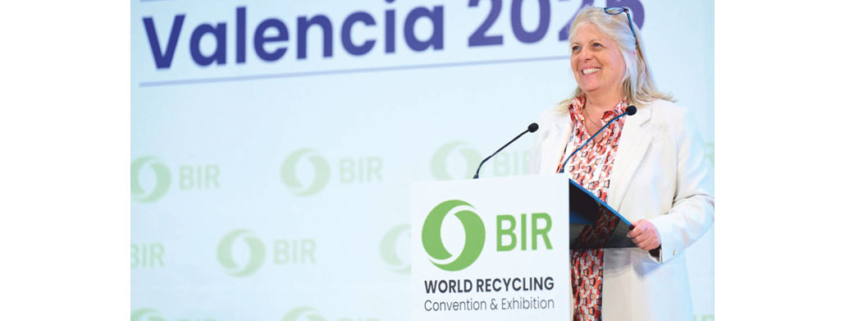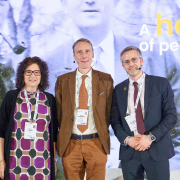BIR World Recycling Convention & Exhibition: Ensuring Free Trade despite Tariffs and other Restrictions
The world is changing – but the answer is NOT blowing in the wind.
More than 1,900 participants, drawn from well over 800 companies and more than 60 countries attended the recent convention of the Bureau of International Recycling (BIR) in Valencia 2025, the world association gave account. “We are more visible and better connected than ever before, with a strengthened secretariat and a dynamic professional advocacy team,” Susie Burrage OBE, President of the global federation of recycling industries, expressed her enthusiasm at the opening session. “BIR is now totally engaged in key international arenas – from the United Nations to the OECD and the European Union – ensuring our industry’s voice is heard at the highest level.” Moreover, she underlined that “we are an integral part of the manufacturing supply chain. We are essential. Without recycled materials, there is no sustainable future.” The Managing Director of UK-based company Recycled Products Ltd also underlined that the recycling sector is able – by combining individual expertise as BIR members and through collaboration – to develop “practical solutions to address the pressing issues we face.”
Uncertainties regarding trade
At the International Trade Council (ITC) meeting concerns about trade tariffs were put in place and planned by the US administration as well as a proposal from the European Commission to limit recycled metal exports to help domestic buyers were major issues.
Tariffs were explored in a keynote address by Professor Philippe Chalmin, of the Cyclope consultancy (FRA). Provided that the situation would be more or less stabilized, he predicted: “Next year tariffs will be between ten to 15 percent, which is huge by the way, and depends on the sector in which you are working.”
Emmanuel Katrakis, Director of Public and Regulatory Affairs at Galloo (FRA/BEL), who chaired the meeting, welcomed an American perspective from Robin Wiener, President of ReMA (USA). According to the information provided by BIR, she reported uncertainty regarding tariffs also in the US. The manufacturing sector would not be supportive of the tariffs, “it wants a strong basis in the US but also wants market access,” she was cited. However, there would be some legitimate issues with the global trading system. “To understand the rationales, there isn’t just one set of tariffs being proposed. There is concern over China… There is the reshoring of jobs in the US and how we would do that. So, there are a lot of rationales being put forward.” There were predictions that tariffs would be at ten percent as well as uncertainty about all parts of the economy.
The European Commission recently held a meeting regarding its Steel and Metals Action Plan, which was published in March. As per Emmanuel Katrakis, the biggest issue in Europe was energy prices, not recycled metals. Also “a few paragraphs” in the Steel and Metals Action Plan aimed at ensuring that scrap materials remain within Europe to maintain their availability. According to the information, he stressed that many meetings were ongoing in Brussels and that he could not divulge what was said, adding: “We are not scrap providers we are putting recycled materials on the market and based on objective figures, there was no problem of recycled metals availability that could justify export restrictions.”
As reported by BIR, Murat Bayram, Managing Director, EMR (GBR) described the world situation as “like a poison in the DNA of an economy. Everyone was looking with a big question mark. It starts with the people, ‘Will I still have my job or not?’; the automobile industry is looking for the people, but they are saying will I buy a new car or not?” And, referring to the chairman’s words on the European situation, he commented: “Additionally we have more and more foggy weather, especially with the discussion you mentioned. The discussion we have had I would say is a wake-up call on the one side and they are not stopping pushing for the regulation but also an eye opener that we are willing to fight.” He also pointed out that “not every recycled steel or non-ferrous material has buyers in Europe at the moment.” During the meeting, panelist Dhawal Shah of Metco Ventures (IND) had positive news to announce on India. The country had consistently been growing by 6.5 to 7.5 percent in GDP (growth domestic product), had become the fourth largest economy surpassing Japan, and has two big programs to make it more self-sufficient. “Over the last five to seven years we have come a long way. At the moment we have a deficit of about 80 billion Dollar, it used to hover at around 120-130 billion Dollar,” he was quoted. In terms of materials, he reported that on the metals side, the infeed would be from imports, and import duties had been removed, except for aluminum which was at 2.5 percent. “You probably have 10-15 years until when we have enough with our recycling.”
New Study on worldwide gains through recycling
The importance of having hard, data-driven facts when advocating on behalf of the industry was double-underlined at the latest meeting of BIR’s International Environment Council (IEC), the global federation of recycling industries stated. The session “began with a potent example of how fact-based advocacy had been used by the recycling industry to counter the inaccurate arguments of vested interests seeking the introduction of export restrictions on Europe’s recycled steel. The meeting concluded with a sneak preview of a heavily-researched and potentially game-changing study co-funded by BIR and KPMG, which will detail in hard numbers the massive and wide-ranging environmental gains achieved worldwide through recycling.”
In this context, IEC Chairman Olivier François, President of EuRIC, described the upcoming BIR/KPMG publication as “absolutely key to showing the politicians that this connection between the circular economy and decarbonization must be done”. The update on the “Environmental Benefits of Recycling” study was given by Stéphanie Grandjean Mateos and Mina Bishop, respectively Director and Senior Manager of Circular Economy at KPMG France’s ESG Centre of Excellence. According to the information, the report – now in its final stages before release – would be significantly wider in scope than its predecessors released in 2008 and 2016. “The number of recycled materials addressed had been increased to 10 and key performance indicators had been extended so that coverage now encompassed: CO2 emission savings; energy savings; water savings; raw material savings; and land use savings or ozone depletion.” Furthermore, the information has been drawn from a very wide range of sources and based on actual market data/realities. As emphasized, the study showed a clear link between decarbonization and recycling/the circular economy.
“The numbers are very big – very big – and very interesting,” BIR Director General Arnaud Brunet was quoted assuring the attending delegates. He is convinced that the high expectations surrounding this publication were justified.
(Published in GLOBAL RECYCLING Magazine 2/2025, Page 3, Photo: BIR)






